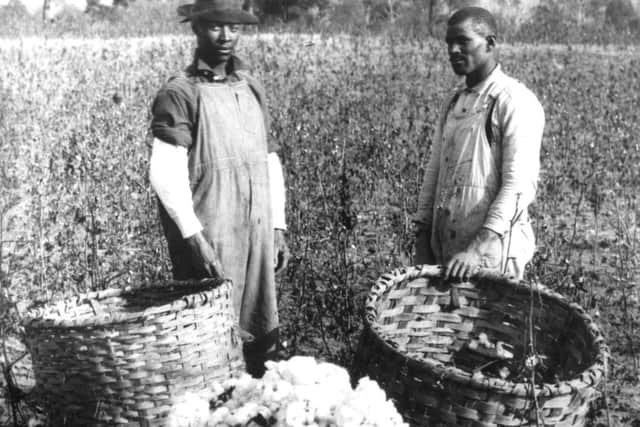Susan Dalgety: USA - a land born of racism and slavery returning to its roots
The three women in front of me had had enough. “It’s too much, just too much,” said one, clearly the boss.
“Yes it is, yes it is, sister,” her companions responded, as if in church.
Advertisement
Hide Ad“It’s just too much, it’s too heart-breaking, let’s go upstairs,” decided the woman in charge, and the trio headed, slowly, for the exit sign.


We were in the Slavery and Freedom hall of the National Museum of African American History and Culture, a few blocks from the White House.
And the women were right, it was too much, too heart-breaking, to read of how our modern world was created, not by innovation or discovery alone, but by the enslavement of these women’s ancestors.
The transatlantic slave trade, which saw more than 12 million Africans stolen from their homes and shipped to the Americas, created a new world order.
Europeans got rich on sugar, as did the tobacco merchants of Glasgow and Liverpool.


The American colonies rebelled when they realised they could create a great economy built on human bondage.
Advertisement
Hide AdEventually, an imperfect union, a United States of America, rose from the bitter ashes of a civil war over slavery.
I cringed when I read how Britain, and Portugal, led the world in this cruel trade. I cried when I turned a corner and caught a glimpse of an image of a young African slave, smiling. She looked just like Vitumbiko, the young woman whose wedding I attended only a few weeks ago in Malawi.
Advertisement
Hide AdAnd I stood awestruck by the cruelty of a quote highlighted in the exhibition: “Negroes are a perishable commodity. When you have the opportunity, dispose of them for gold,” said one Humphrey Morrice in 1730.
Twelve million men, women and children, a perishable commodity. No wonder those three women found it all too much.
Since the museum opened in 2016, three and a half million people have flocked to see it. It is so popular that entry is restricted.
You need to book a ticket well in advance to have any chance of seeing the exhibits, which range from slavery to segregation, the blues to the civil rights movement, hip-hop to President Barack Obama.
But it doesn’t just tell the story of the African American community and their continuing struggle for equality and justice.
It tells the story of the United States of America, because if there is one thing that defines this country, it is slavery and its aftermath.
Advertisement
Hide AdThe day before our visit to the museum, the ABC network cancelled its most popular show after its star, Roseanne Barr, tweeted a racist insult about Valerie Jarrett, a former adviser to President Obama.
Ms Barr, an ardent supporter of Donald Trump, has form. This is not the first time she has compared a prominent black woman to an ape. And she is generous in her prejudice, tweeting anti-Semitic slurs as well as racist ones.
Advertisement
Hide AdShe blamed sleeping pills for her most recent outburst, while her supporters took to social media to defend her. “It’s a witch hunt because Roseanne is a big-time Trump supporter,” seems to be their sincere, if distorted, view.
We followed the scandal on Twitter as we toured the Capitol, the shining white, monumental building that houses Congress, the federal legislature that runs the country, in partnership – sometimes – with the judiciary and the President.
Despite its 19th century grandeur, the Capitol feels considerably more informal, and accessible, than Westminster. Truth be told, America feels more informal, more accessible, than Britain.
“Stay together, don’t touch the statues and take all the pictures you want,” instructed our cheerful guide Alicia, before pointing out that the “mother of the civil rights movement” Rosa Parks was the only seated statue “because of the bus,” she laughed, respectfully.
Then, more seriously, she said, “in the 1840s, you would have had to walk past a slave market to get to the Capitol”.
Slaves built the Capitol, and the White House, as former First Lady, Michelle Obama, a descendant of slaves, liked to remind the country on occasion.
Advertisement
Hide AdSlaves also built America. The 50 states are united because abolitionists won the civil war. Black music, from the beating heart of Africa, is the country’s biggest cultural export. The civil rights movement showed America at its best, and its worst.
Ten years ago, the election of young black senator to the highest office in the land gave the world a tantalising glimpse of a future America, a nation proud of its diversity, one that had come to terms with its bloody, brutal past.
Advertisement
Hide AdBut even Obama, that most optimistic of politicians, the man who persuaded Americans in the grip of a terrifying recession that “yes we can”, has his moments of doubts about his country’s future cohesion.
In a book due out next week, Ben Rhodes, one of his former advisers, reveals that after Trump’s victory Obama mused: “Sometimes I wonder whether I was 10 or 20 years too early.”
He went on: “Maybe we pushed too far ... Maybe people just want to fall back into their tribe.”
Listening to America tear itself apart over Trump, and the bitter divisions he has, sometimes gleefully, exposed, it is hard not share Obama’s pessimism, which seems unnatural for him.
Perhaps this imperfect union is doomed to remain a country of warring tribes, black and brown against white.
Maybe the foul-mouthed Roseanne Barr is the authentic voice of white America, just as her eponymous show accurately portrayed the ups and downs of working-class life.
Advertisement
Hide AdTo paraphrase Tom Nairn, has the American dream been strangled by Fox News and Trump’s Twitter feed?
Or, to borrow a popular African American expression, one that adorns the national museum, can Americans make a way out of no way?
Advertisement
Hide AdCan this country, born of slavery and built on immigration, struggling with its national identity and stark economic inequality, find a way to unite all its people to fulfil its early promise of life, liberty and the pursuit of happiness.
Let’s hope it can.
Scotsman columnist Susan Dalgety is spending the next six months on a journey around Donald Trump’s America in a 23-yer-old campervan filing regular reports along the way.
